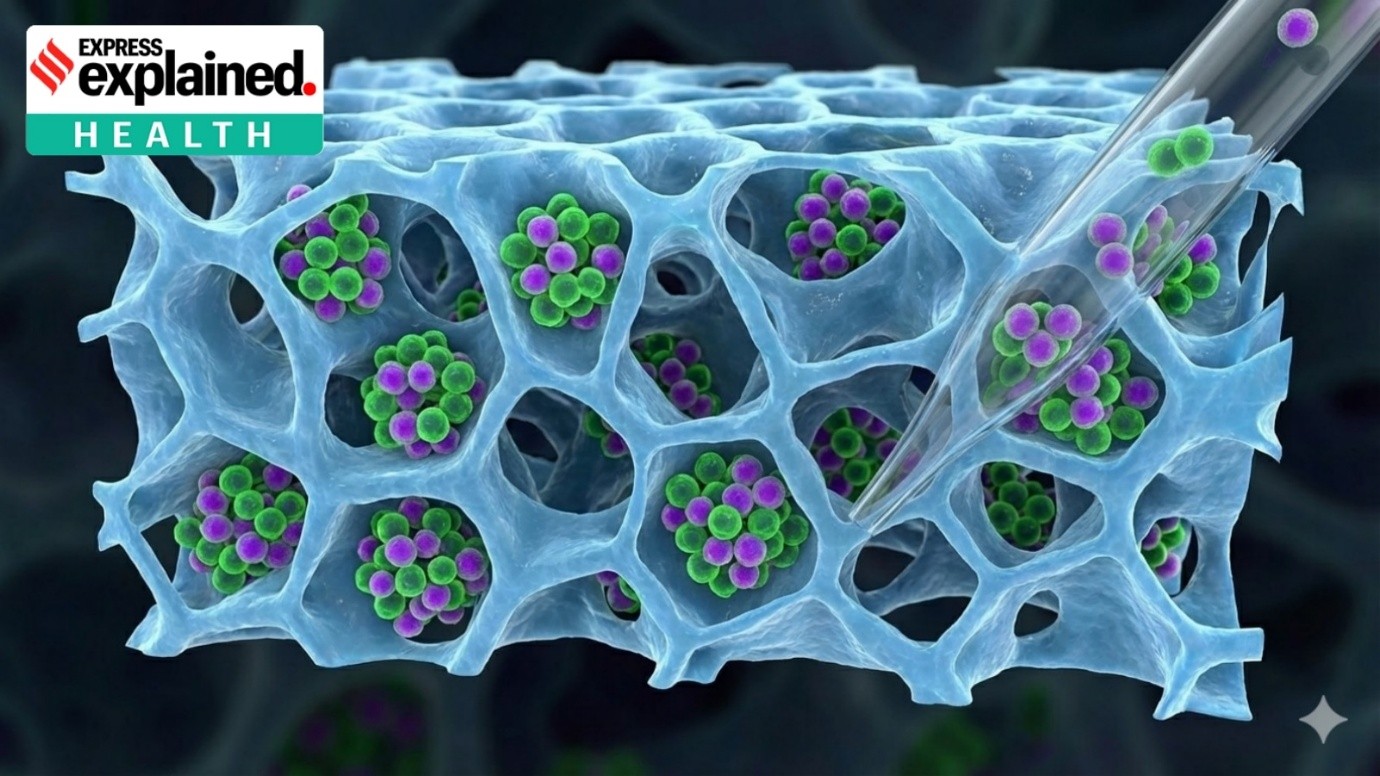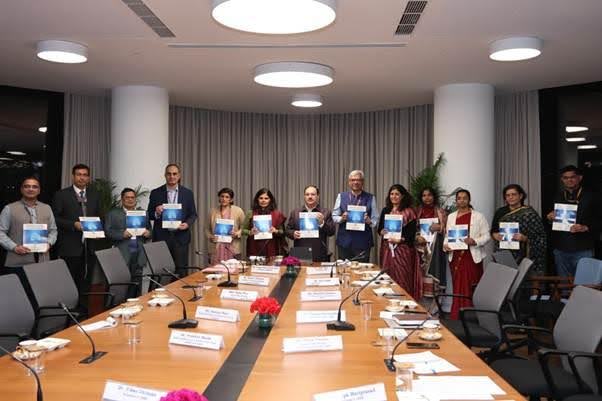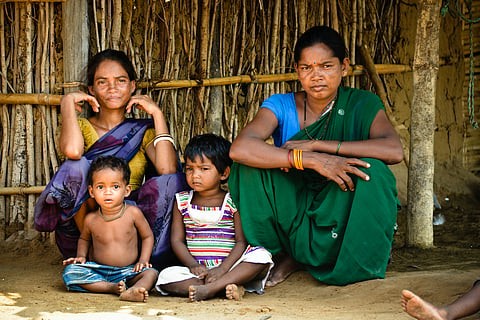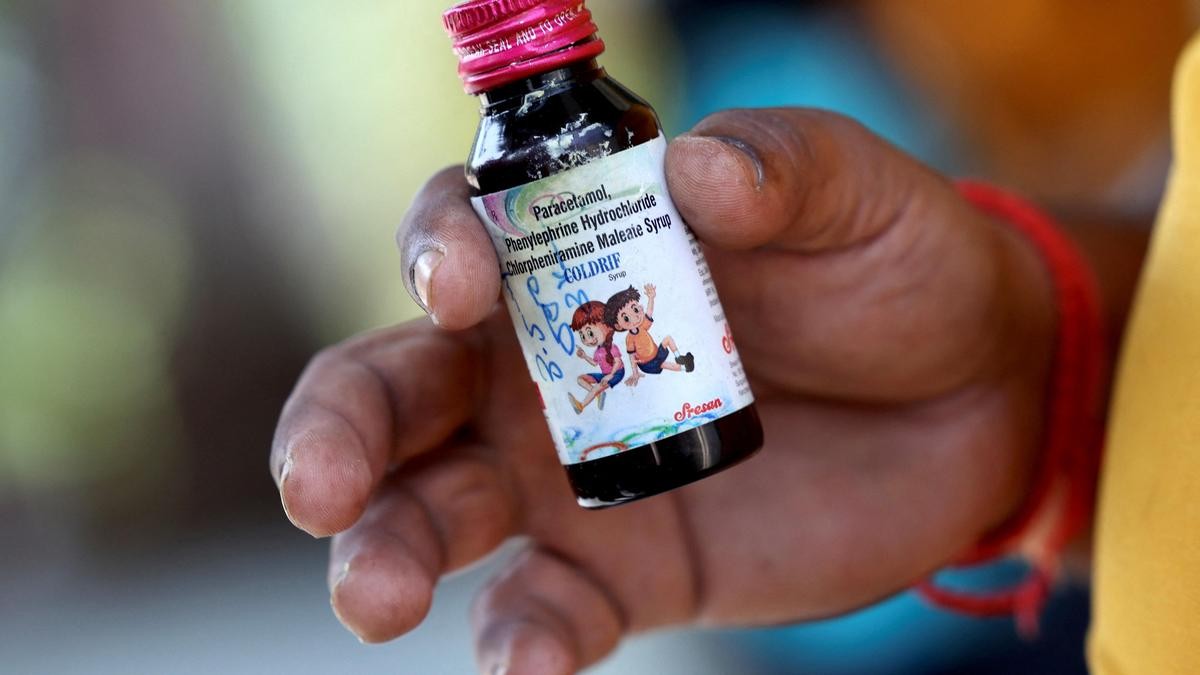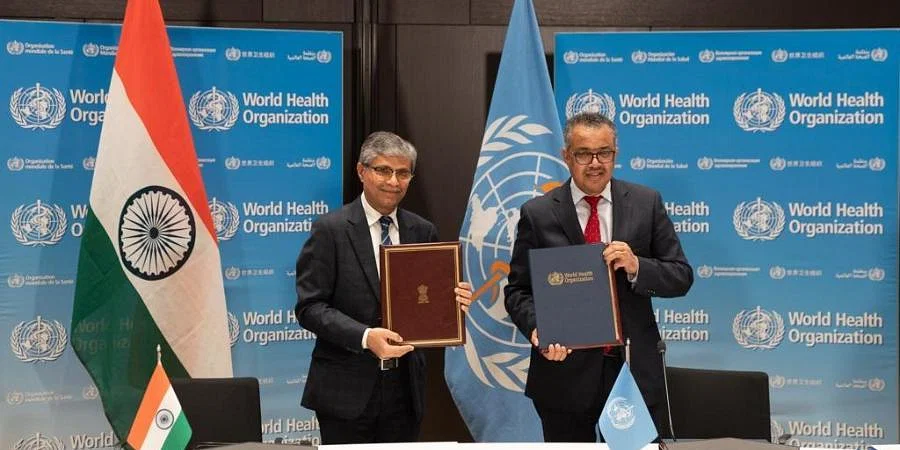
Picture Courtesy: deshgujarat.com
Context: The WHO Traditional Medicine Global Summit 2023 in Gujarat, India, concluded with the "Gujarat Declaration", a document that reaffirms the global commitments to indigenous knowledge, biodiversity, and traditional, complementary, and integrative medicine (TCIM).
Details
- In Gandhinagar, Gujarat, India, the Ministry of Ayush co-hosted the First Global Summit on Traditional Medicine with WHO in August 2023. The summit was a platform for experts and stakeholders to exchange views and experiences on how to integrate traditional medicine into global health strategies and policies. The summit aimed to promote the recognition, regulation and research of traditional medicine as a valuable resource for health and well-being.
- The Summit concluded with the "Gujarat Declaration", The declaration recognizes the value and potential of TCIM for health and well-being, and calls for increased collaboration, research, and regulation of indigenous knowledge, biodiversity, and traditional, complementary, and integrative medicine (TCIM) practices and products.
- The declaration also urges the protection and promotion of the rights and interests of indigenous peoples and local communities, who are the custodians of TCIM knowledge and resources.
Key points from the declaration
Scientific Rigor
- The declaration underscores the importance of applying rigorous scientific methods in the field of traditional medicine. This scientific approach is necessary to gain a deeper understanding of traditional medicine practices, assess their effectiveness, and determine when and how to apply them.
- It emphasizes the need to take into account the holistic, context-specific, complex, and personalized nature of traditional medicine when considering its role in health and well-being.
India's Role
- India's hosting of the WHO Global Traditional Medicine Centre in Jamnagar, Gujarat, is recognized as a significant contribution to advancing traditional medicine globally. This centre is seen as instrumental in enhancing WHO's capacity to assist member states and stakeholders in implementing the action agenda established during the summit.
- India's commitment to traditional medicine is acknowledged as a valuable asset in promoting the use of traditional medicine worldwide.
Action Points
- The action points of the summit are formulated based on the evidence, discussions, and outcomes of the event. These action points cover a wide array of topics, including:
- Strategies and policies that promote the well-being of individuals and the planet.
- The importance of researching to gather evidence supporting traditional medicine practices.
- The goal of achieve universal health coverage and make healthcare accessible to all.
- Strengthening primary healthcare systems and integrating traditional medicine into these systems.
- Utilizing data and information systems for monitoring and assessing traditional medicine practices.
- Exploring the use of digital health technologies, especially artificial intelligence, in the context of traditional medicine.
- Strategies for preserving biodiversity and ensuring sustainable use of natural resources in traditional medicine.
- Upholding human rights, promoting equity, and adhering to ethical principles in traditional medicine research and practice.
Commitment to Traditional Medicine
- The Union Minister of Ayush highlights the declaration as a demonstration of India's commitment to promoting traditional medicine systems. The emphasis is on collaborative efforts and sustainable practices to secure a healthier future for generations by integrating traditional medicine into modern healthcare.
Harnessing Traditional Medicine
- WHO Director-General, views the declaration as a means to unlock the potential of traditional medicine by applying scientific principles. It underscores the importance of integrating traditional medicine into national healthcare systems and harnessing its power for the benefit of public health.
Universal Health Coverage (UHC) and SDGs
- The declaration aims to scale up traditional, complementary, and integrative medicine (TCIM) interventions that are evidence-based to support universal health coverage (UHC) and the achievement of Sustainable Development Goals (SDGs).
- It recognizes the necessity of collaboration among regions, disciplines, and stakeholders to maximize the contributions of TCIM to global health.
Research and Standardization
- The declaration encourages the integration of evidence-based TCIM practices into national health policies and systems. It calls for expediting the production, regulation, and formal utilization of scientifically proven TCIM products and practices.
- The standardized documentation and data collection using the WHO International Classification of Diseases (ICD-11) are promoted to ensure consistency and reliability.
Digital Health and AI
- The summit highlights the potential of digital health technologies, especially artificial intelligence (AI), in advancing digital health resources related to TCIM for the betterment of people's health and well-being. This underscores the importance of embracing technological advancements in the traditional medicine field.
Biodiversity and Indigenous Rights
- The declaration recommends actions to protect, restore, and sustainably manage biodiversity while ensuring fair and equitable sharing of benefits from biodiversity resources. It stresses the recognition, respect, and protection of the rights of Indigenous Peoples as outlined in the UN Declaration on the Rights of Indigenous Peoples.
Ethical Practices
- Ethical principles and processes should be an integral part of TCIM research and practice. This emphasizes the importance of conducting TCIM research and applying traditional medicine in a manner that respects ethical standards and principles.
Indigenous knowledge, biodiversity, and Traditional, Complementary, and Integrative Medicine (TCIM)
About
- TCIM are interconnected aspects of healthcare that have profound implications for both traditional and modern medical practices.
- Indigenous knowledge refers to the traditional knowledge and practices passed down through generations within specific cultural or ethnic groups. This knowledge encompasses various aspects of life, including medicine, agriculture, and environmental management.
- Biodiversity refers to the variety of life forms on Earth, including plants, animals, and microorganisms. Biodiversity is closely linked to indigenous knowledge because many indigenous communities have developed extensive knowledge about local ecosystems and the use of diverse plant and animal species for medicinal and nutritional purposes.
- TCIM encompasses a wide range of healthcare practices and systems, including traditional medicines like Ayurveda, traditional Chinese medicine, herbal remedies, acupuncture, and more. Integrative medicine combines elements of TCIM with conventional Western medicine to provide a holistic approach to healthcare.
Features
Holistic Approach
- Holistic healthcare, as embraced by indigenous knowledge and TCIM, recognizes that a person's health is influenced by multiple interconnected factors, including physical, mental, emotional, and spiritual aspects. It emphasizes the importance of balance and harmony within the individual and their environment.
- Holistic approaches often involve practices such as meditation, prayer, or rituals to address mental and spiritual well-being, alongside physical remedies.
Local Adaptation
- Indigenous knowledge is intimately tied to specific geographical regions and ecosystems. It reflects the deep understanding that indigenous communities have developed over generations about their local environment, climate, and resources.
- The adaptation of healthcare practices to local conditions ensures that remedies are suited to the prevalent diseases, available plants and herbs, and cultural preferences of a given region.
Natural Remedies
- Indigenous knowledge and TCIM place a strong emphasis on using natural resources, such as medicinal plants, herbs, minerals, and animal products, for healing purposes.
- Natural remedies are often preferred due to their perceived safety and minimal side effects compared to synthetic drugs. However, they also require responsible harvesting and conservation efforts to protect biodiversity.
Cultural Significance
- These practices are deeply embedded in the cultural heritage of indigenous communities. They often involve rituals, ceremonies, and storytelling that are passed down through generations.
- TCIM and indigenous knowledge systems are not merely healthcare practices but integral components of cultural identity, strengthening the connection between individuals and their heritage.

Significance
Conservation of Biodiversity
- Indigenous knowledge systems often include practices that promote the sustainable use of natural resources. This helps protect biodiversity by preventing over-harvesting of plants, animals, and other resources.
- Indigenous communities have a deep understanding of local ecosystems and often act as stewards of their environments, helping to maintain the delicate balance of biodiversity.
Cultural Preservation
- Indigenous knowledge and TCIM are intrinsically linked to the cultural heritage of communities. They represent the accumulated wisdom and practices passed down through generations.
- By preserving these traditions, indigenous knowledge and TCIM play a pivotal role in maintaining the cultural identity of indigenous communities. They contribute to a sense of continuity and pride in cultural heritage.
Access to Healthcare
- In many remote and underserved regions, modern healthcare facilities may be scarce or inaccessible. TCIM provides a valuable alternative, offering accessible and affordable healthcare options to communities that may otherwise have limited access to medical services.
- TCIM's focus on natural remedies often makes it more accessible to communities with limited financial resources.
Holistic Health
- The holistic approach of TCIM recognizes the interconnectedness of various aspects of health, including physical, mental, emotional, and environmental factors.
- As modern medicine increasingly acknowledges the importance of these holistic factors in overall health, TCIM offers a complementary and integrated approach to healthcare that aligns with evolving healthcare paradigms.
Steps Taken by India
Documentation and Research
- Knowledge Preservation: India has made efforts to document and preserve traditional knowledge systems such as Ayurveda, Siddha, and Unani. This involves cataloguing the wealth of information on medicinal plants, treatment methods, and healthcare practices.
- Scientific Validation: Research institutions and universities conduct scientific studies to validate the safety and efficacy of TCIM practices. This scientific approach helps bridge the gap between traditional knowledge and modern healthcare standards.
Regulation and Standardization
- Ministry of AYUSH: The establishment of the Ministry of AYUSH (Ayurveda, Yoga & Naturopathy, Unani, Siddha, and Homoeopathy) demonstrates India's commitment to regulating and standardizing TCIM practices. This ministry oversees the promotion, development, and regulation of traditional medicine systems.
- Quality Control: Regulatory bodies under the Ministry of AYUSH work to ensure that TCIM products and practices meet quality and safety standards. This helps build trust in these systems among both practitioners and patients.
Integration with Modern Medicine
- National Healthcare System Integration: India has integrated TCIM into its national healthcare system. This integration allows patients to access TCIM treatments alongside conventional Western medicine, providing a more comprehensive healthcare approach.
- Cross-Disciplinary Collaboration: Collaborative efforts between TCIM practitioners and modern healthcare professionals facilitate knowledge exchange and enable patients to benefit from a wider range of healthcare options.
Education and Training
- Qualified Workforce: India recognizes the importance of having well-trained practitioners in TCIM. Educational programs and institutions have been established to provide rigorous training, ensuring that practitioners have the necessary skills and knowledge to deliver safe and effective healthcare.
- Research and Innovation: These educational institutions also contribute to research and innovation in TCIM, helping to advance the field and adapt traditional practices to contemporary healthcare needs.
Challenges
Lack of Standardization
- Diverse Practices: TCIM encompasses a wide range of practices and traditions, each with its unique methods and remedies. Standardizing these practices to ensure consistent quality and safety can be complex.
- Quality Control: Ensuring the quality and efficacy of TCIM products and treatments is challenging without standardized guidelines and protocols.
Intellectual Property Rights
- Biopiracy Concerns: Indigenous communities often hold valuable knowledge about the use of local flora and fauna for medicinal purposes. Protecting this knowledge from exploitation and unauthorized commercialization (biopiracy) is a significant concern.
- Benefit Sharing: Establishing fair mechanisms for sharing benefits with indigenous communities when their traditional knowledge leads to commercial products or drugs is an ongoing challenge.
Acceptance and Recognition
- Cultural Bias: Cultural biases and prejudices may lead to scepticism or dismissal of TCIM by some members of the healthcare community, hindering its acceptance and recognition.
- Lack of Awareness: Many people may not be aware of the potential benefits of TCIM or may lack access to reliable information about these practices.
Sustainability
- Overharvesting: The unsustainable harvesting of medicinal plants and other natural resources for TCIM can lead to environmental degradation and the depletion of biodiversity.
- Climate Change: Climate change can alter the distribution of medicinal plants and impact the effectiveness of traditional remedies, posing challenges to the sustainability of TCIM practices.
Way Forward
Collaboration
- Encourage interdisciplinary collaboration involving traditional practitioners, scientists, and healthcare professionals. This collaboration can facilitate knowledge exchange, validation of practices, and the development of evidence-based treatments.
- Create platforms for dialogue and information sharing between traditional healers and modern medical practitioners to promote mutual understanding and cooperation.
Sustainable Practices
- Promote sustainable harvesting and cultivation of medicinal plants and other natural resources used in TCIM. This includes implementing responsible harvesting techniques and supporting community-based conservation efforts.
- Encourage the adoption of organic and environmentally friendly cultivation methods to minimize the ecological impact of TCIM practices.
Education and Awareness
- Develop educational programs and campaigns aimed at raising public awareness about TCIM and indigenous knowledge. These initiatives should emphasize the benefits, safety, and cultural significance of these practices.
- Provide training and capacity-building opportunities for healthcare professionals, researchers, and traditional practitioners to enhance their understanding of TCIM and its integration with modern healthcare.
Protection of Indigenous Rights
- Strengthen legal frameworks to protect the intellectual property rights of indigenous communities. This includes developing mechanisms for prior informed consent, benefit sharing, and preventing biopiracy.
- Empower indigenous communities to participate in decision-making processes related to the commercialization of their knowledge and ensure they receive fair compensation for their contributions.
Research and Validation
- Continue funding and supporting research initiatives aimed at scientifically validating TCIM practices and products. This research should follow rigorous scientific standards and include clinical trials and studies.
- Collaborate with traditional practitioners to document and analyze their knowledge, practices, and treatment outcomes, incorporating both traditional wisdom and modern scientific methodologies.

Conclusion
- The Gujarat Declaration represents a comprehensive framework for advancing traditional medicine within the context of global health, promoting scientific rigour, cultural preservation, and ethical practice. It aims to harness the potential of traditional medicine systems to contribute to the well-being of individuals and communities worldwide.
Must Read Articles:
WHO Global Summit on Traditional Medicine: https://www.iasgyan.in/daily-current-affairs/who-global-summit-on-traditional-medicine
World Health Organisation (WHO): https://www.iasgyan.in/daily-current-affairs/world-health-organisation-who
|
PRACTICE QUESTION
Q. What are the recent developments in the field of traditional medicines in India, and why are these developments significant in the context of healthcare? What are the key challenges facing the integration and promotion of traditional medicines in India, and what strategies can be suggested for the way forward in harnessing the potential of traditional medicine for improved healthcare outcomes?
|
https://pib.gov.in/PressReleasePage.aspx?PRID=1954558






